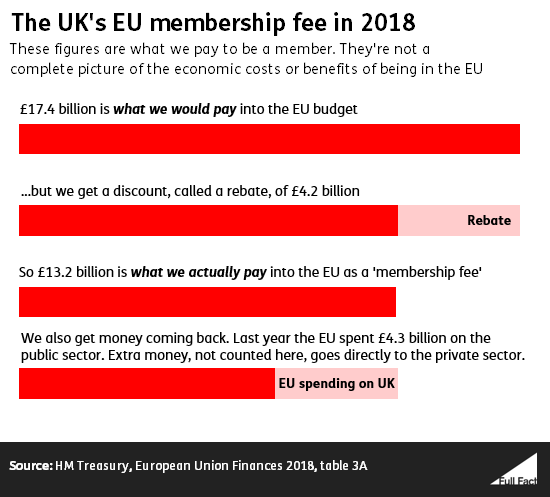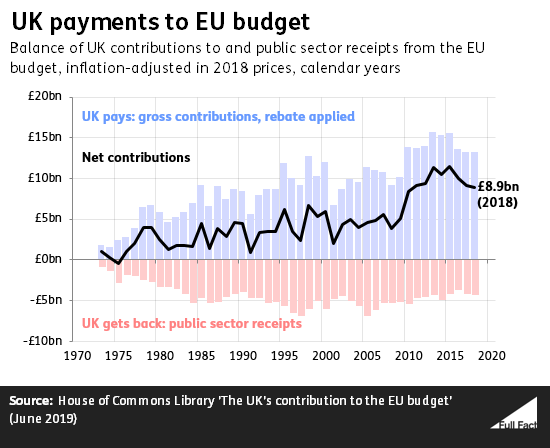The UK's EU membership fee
The UK pays more into the EU budget than it gets back.
In 2018 the UK government paid £13 billion to the EU budget, and EU spending on the UK was forecast to be £4 billion. So the UK’s ‘net contribution’ was estimated at nearly £9 billion.
Each year the UK gets a discount on its contributions to the EU—the ‘rebate’—worth about £4 billion last year. Without it the UK would have been liable for £17 billion in contributions.

The UK doesn’t pay or "send to Brussels" this higher figure of £17.4 billion, or anything equivalent per week or per day. The rebate is applied straight away (its size is calculated based on the previous year's contributions), so the UK never contributes this much.
The UK’s contributions to the budget vary from year to year, and are forecast to grow towards the end of the decade. They’ve been larger recently than in previous decades.

A membership fee isn’t the same as the total economic cost or benefit of EU membership.
Being in the EU costs money but does it also create trade, jobs and investment that are worth more?
We can be pretty sure about how much cash we put in, but it’s far harder to be sure about how much, if anything, comes back in economic benefits.
Honesty in public debate matters
You can help us take action – and get our regular free email
£350 million a week doesn’t include the rebate
It’s been claimed that we send £350 million a week to the EU. That misses out the rebate, and it doesn’t represent the total economic costs and benefits of EU membership to the UK.
£350 million is roughly what we would pay to the EU budget without the rebate. The UK actually paid closer to £250 million a week.
The UK Statistics Authority has said the EU membership fee figure of £19 billion a year, or £350 million a week, is "not an amount of money that the UK pays to the EU each year".
Since then, the new chair of the Authority described use of the figure by the Foreign Secretary, Boris Johnson, as “a clear misuse of official statistics”.
The UK gets money back
The government then gets some of that money back, mainly through payments to farmers and for poorer areas of the country such as Wales and Cornwall.
In 2017, the UK's ‘public sector receipts’ are estimated to be £4.3 billion.
So overall we paid in £8.9 billion more than we got back.
The Treasury figures note payments the EU makes directly to the private sector, such as research grants. In 2016, these were worth an estimated £2.3 billion, so including them could reduce our net contribution further still.
The money we get back will be spent on things the government may or may not choose to fund upon leaving the EU. It’s not enough to look at the net contribution in isolation because what we get back isn’t fully under our control.
Different figures from different sources
The Treasury's European Union Finances release provides the best figures for the UK’s contributions to the EU budget, according to the ONS.
The Treasury and ONS both publish figures on the subject, but they're slightly different. The ONS also publishes other figures on contributions to EU institutions which don't include all our payments or receipts, which complicates matters.
The ONS figures ultimately come from the Treasury, and the numbers aren't the same because they categorise and account for the payments differently.
The European Commission is still another source of information which shows lower contributions.